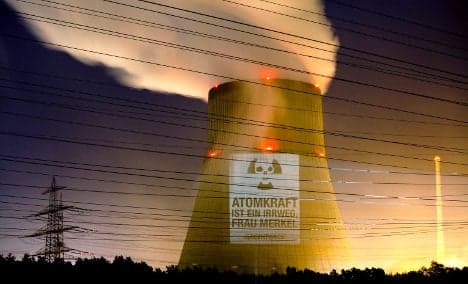Nuclear power is only cheap for the industry

The atomic energy industry is pushing to delay Germany’s phase-out of nuclear power. But Marcus Gatzke from ZEIT ONLINE warns doing so could hurt the country’s switch to renewable energy – and consumers’ pocketbooks.
Atomic energy = cheap power!
That pretty much sums up the mantra of proponents of extending the lifespan of Germany’s nuclear reactors. They claim consumers will end up footing the bill if the country’s ageing atomic power plants are phased out as planned. “Energy cannot become a luxury item,” says Economy Minister Rainer Brüderle from the pro-business Free Democrats (FDP).
It’s an argument that’s easy to sell to the public. It speaks directly to average citizens, seems pretty plausible and is easy to explain: Renewable energy is expensive and has to be subsidised, whereas nuclear power doesn’t.
But that’s the thing with such political debates – the argument doesn’t hold up under closer scrutiny. Electricity in Germany isn’t particularly cheap. In theory, the German power market has been liberalised since 1998, but there is little true competition. The four large atomic energy firms produce around 80 percent of Germany’s power. This market dominance keeps consumers from profiting from economically produced nuclear power.
If the lifespan of reactors is extended, it will merely cement this dominance – likely leading to higher prices. On the other hand, systematically taking nuclear power plants off the grid would provide openings for potential competitors. Many municipal utilities have already prepared for the nuclear phase-out by investing in renewable energy. Keeping reactors running longer will snuff out their chances before they even get started.
A rapid conversion to renewable energy would have the added benefit of hindering a market-dominating concentration of power production. In the future, electricity creation will be more decentralised and there will be a greater number of providers. Proper competition ensures lower prices and hinders companies from developing a market monopoly.
Opponents of subsidising renewable energy should also realise that the atomic energy industry received €165 billion in support from 1950 to 2008 – including €65 billion in tax breaks alone. This is the only reason nuclear power can be produced so cheaply. But virtually none of this huge subsidy has been passed on to consumers.
Surely executives at EON and RWE, unhappy with the government’s plans to make them pony up for renewable energy, can explain the reasons for this to Chancellor Angela Merkel.
This commentary was published with the kind permission of ZEIT ONLINE, where it originally appeared in German. Translation by The Local.
Comments
See Also
Atomic energy = cheap power!
That pretty much sums up the mantra of proponents of extending the lifespan of Germany’s nuclear reactors. They claim consumers will end up footing the bill if the country’s ageing atomic power plants are phased out as planned. “Energy cannot become a luxury item,” says Economy Minister Rainer Brüderle from the pro-business Free Democrats (FDP).
It’s an argument that’s easy to sell to the public. It speaks directly to average citizens, seems pretty plausible and is easy to explain: Renewable energy is expensive and has to be subsidised, whereas nuclear power doesn’t.
But that’s the thing with such political debates – the argument doesn’t hold up under closer scrutiny. Electricity in Germany isn’t particularly cheap. In theory, the German power market has been liberalised since 1998, but there is little true competition. The four large atomic energy firms produce around 80 percent of Germany’s power. This market dominance keeps consumers from profiting from economically produced nuclear power.
If the lifespan of reactors is extended, it will merely cement this dominance – likely leading to higher prices. On the other hand, systematically taking nuclear power plants off the grid would provide openings for potential competitors. Many municipal utilities have already prepared for the nuclear phase-out by investing in renewable energy. Keeping reactors running longer will snuff out their chances before they even get started.
A rapid conversion to renewable energy would have the added benefit of hindering a market-dominating concentration of power production. In the future, electricity creation will be more decentralised and there will be a greater number of providers. Proper competition ensures lower prices and hinders companies from developing a market monopoly.
Opponents of subsidising renewable energy should also realise that the atomic energy industry received €165 billion in support from 1950 to 2008 – including €65 billion in tax breaks alone. This is the only reason nuclear power can be produced so cheaply. But virtually none of this huge subsidy has been passed on to consumers.
Surely executives at EON and RWE, unhappy with the government’s plans to make them pony up for renewable energy, can explain the reasons for this to Chancellor Angela Merkel.
This commentary was published with the kind permission of ZEIT ONLINE, where it originally appeared in German. Translation by The Local.
Join the conversation in our comments section below. Share your own views and experience and if you have a question or suggestion for our journalists then email us at [email protected].
Please keep comments civil, constructive and on topic – and make sure to read our terms of use before getting involved.
Please log in here to leave a comment.